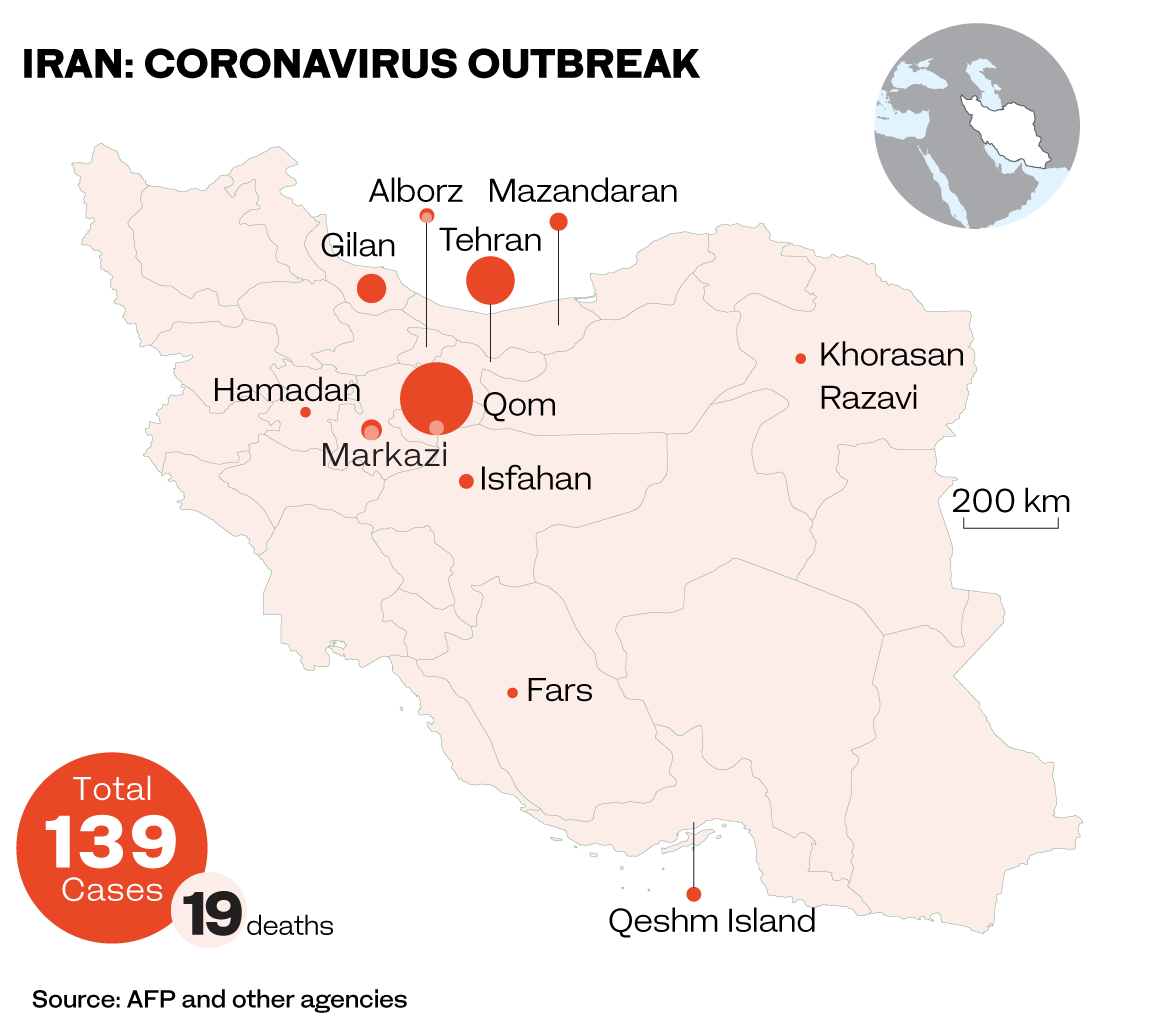TEHRAN: Iran “seems to be concealing information about the (coronavirus) epidemic,” Paris-based media watchdog Reporters Without Borders (RSF) on Wednesday said.
It condemned what it termed “Iran’s persecution of media outlets and journalists publishing independent information.”
Reza Moini, head of RSF’s Iran desk, said: “Respect for the public’s right to full, independent, diverse and quality news reporting... is the best way to protect the population and combat rumors. Withholding information can kill.”
President Hassan Rouhani, for his part, accused Iran’s arch foe the US of trying to use propaganda about the virus to instil “fear” against his country.
The Americans “themselves are struggling with coronavirus,” Rouhani said in a weekly cabinet meeting.
He added that “16,000 people have died of influenza there but they don’t talk about their own (dead).”
Rouhani’s remarks came a day after US Secretary of State Mike Pompeo accused Iran of concealing the full extent of the outbreak, saying “Tehran may have suppressed vital details.”
The virus has also infected Iranian officials.
Opinion
This section contains relevant reference points, placed in (Opinion field)
Deputy health minister Harirchi had coughed and repeatedly wiped sweat from his brow at a joint news conference Monday with government spokesman Ali Rabiei, who is now himself awaiting the results of a coronavirus test.
Harirchi stirred controversy at the time by denying a lawmaker’s claim that 50 people had died from the virus in Qom, the epicenter of Iran’s outbreak.
The latest health ministry figures show the virus has spread across the country.
There were 15 new cases in Qom, nine in Gilan in the north, four in the capital Tehran and three in Fars in southern Iran, it said.
Meanwhile, Iranian cyber police on Wednesday announced the arrests of 24 people accused of online rumor-mongering about the spread of a coronavirus outbreak that has claimed 19 lives in the country.
The Islamic republic is scrambling to contain COVID-19 a week after announcing the first two deaths in Qom, a center for Islamic studies that draws pilgrims and scholars from abroad.
Schools, universities and cultural centers have been closed, sporting events canceled and teams of sanitary workers deployed to disinfect buses, trains and public spaces.
International health experts have expressed concern about Iran’s handling of the outbreak — the deadliest for any country other than China.
Such worries mounted on Tuesday when the head of the taskforce combatting the virus, Deputy Health Minister Iraj Harirchi, admitted he himself had been infected.
But health ministry spokesman Kianoush Jahanpour said the situation was “improving,” even as he announced four more deaths and 44 new infections, including in six previously unaffected provinces.
The head of a newly established cyber police unit announced the arrest of 24 people accused of online rumor-mongering about the spread of the virus.

They were handed over to the judiciary, while 118 other Internet users were briefly detained and received warnings, Vahid Majid said, cited by semi-official news agency ISNA.
The arrests were carried out after the establishment of a special unit to “combat rumor-mongers regarding the ‘spread of coronavirus in the country’,” he was quoted as saying.
“The police are monitoring all the news published in the country’s cyberspace.”
Majid said the unit would take action over news, pictures or videos that “contain rumors or fake news meant to disturb the public and increase concern in society.”
The ministry added that Markazi, Kermanshah, Ardebil, Mazandaran and Semnan provinces each had one new case.
Newly hit regions included southwestern Khuzestan, which reported three infections.
The others were Lorestan in the west, Semnan in northern central Iran and Kohgiluyeh and Boyerahmad, as well as in the southern provinces of Hormozgan and Sistan and Baluchistan, which all had two cases each.
The health ministry’s spokesman, Jahanpour, appeared optimistic about the situation in the worst-hit province of Qom, south of Tehran.
“Every 24 hours, at least 10 percent of those hospitalized or suspect cases are discharged with good general health,” the official said.
But in Gilan, “things are slightly concerning,” he added, as it has had the second highest number of new cases, including people who had made trips to other provinces.
The health minister has repeatedly called on Iranians to refrain from traveling to other provinces, especially those infected like Gilan.
Iran is yet to quarantine any of the infected cities, including Qom, with authorities dismissing the method as outdated and ineffective.






























